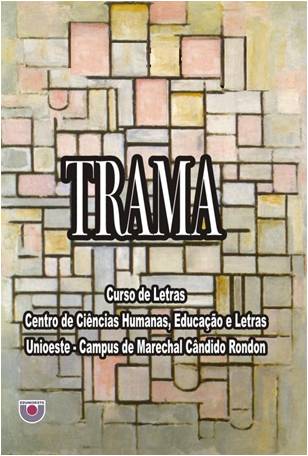A CHANSON DE ROLAND NA GÊNESE DO GRANDE SERTÃO: UM EXERCÍCIO DIALÓGICO
DOI:
https://doi.org/10.48075/rt.v10i19.9766Keywords:
criação literária, apropriação, intertextualidade, ficção,Abstract
This paper aims to present a comparative analysis between the novelGrande sertão: veredas, by JoãoGuimarães Rosa, and the anonymous medieval french
poem Chanson de Roland. It is my intention to demonstrate how the creative process of
the work of Rosa, extremely related to the language itself, to memory and to the
traditional imaginary of “sertão” (this brazilian denomination of a specific region)
leads the reader to observe the similarities between this novel and the chanson de geste
that flourished in the eleventh century; in a more specific way, I intend to show how
JoãoGuimarães Rosa, specially in some epic passages of its novel, uses textual
appropriation of the Chanson, by doing a paraphrase in the very essence of the literary
statement. By this procedure, his creation process is sustained by the intertextuality,
and is characterized by the dialogical practice, what goes far from the documental
character of the regionalist narrative to sign its fictionality. Yet I would like to rebound
that this procedure does not means a eccentricity or extravagance, since the medieval imaginary, in the intersection of cultural universes, is still alive and present i this specif region tradition
Downloads
Published
How to Cite
Issue
Section
License
Aviso de Direito Autoral Creative Commons
Política para Periódicos de Acesso Livre
Autores que publicam nesta revista concordam com os seguintes termos:
1. Autores mantém os direitos autorais e concedem à revista o direito de primeira publicação, com o trabalho simultaneamente licenciado sob a Licença Creative Commons Attribution que permite o compartilhamento do trabalho com reconhecimento da autoria e publicação inicial nesta revista.2. Autores têm autorização para assumir contratos adicionais separadamente, para distribuição não-exclusiva da versão do trabalho publicada nesta revista (ex.: publicar em repositório institucional ou como capítulo de livro), com reconhecimento de autoria e publicação inicial nesta revista.
3. Autores têm permissão e são estimulados a publicar e distribuir seu trabalho online (ex.: em repositórios institucionais ou na sua página pessoal) a qualquer ponto antes ou durante o processo editorial, já que isso pode gerar alterações produtivas, bem como aumentar o impacto e a citação do trabalho publicado (Veja O Efeito do Acesso Livre).
Licença Creative Commons
Esta obra está licenciada com uma Licença Creative Commons Atribuição-NãoComercial-CompartilhaIgual 4.0 Internacional, o que permite compartilhar, copiar, distribuir, exibir, reproduzir, a totalidade ou partes desde que não tenha objetivo comercial e sejam citados os autores e a fonte.


